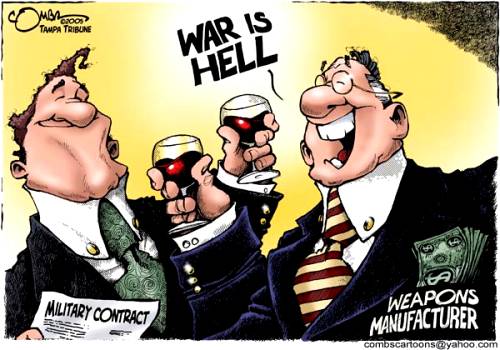The following is a chapter from Money, Sex, Power & Faith.
Order your copy in paperback or for Kindle!
“Dad, how do soldiers killing each other solve the world’s problems?”
– Bill Watterson, Calvin and Hobbes

Shortly after the peak of the American Dream in 1956, Dwight Eisenhower looked over what America had become under his watch, and in 1961, he offered one final warning to the American people as he stepped down from his role as president. “In the councils of government,” he cautioned, “we must guard against the acquisition of unwarranted influence, whether sought or unsought, by the military industrial complex. The potential for the disastrous rise of misplaced power exists and will persist. We must never let the weight of this combination endanger our liberties or democratic processes. We should take nothing for granted. Only an alert and knowledgeable citizenry can compel the proper meshing of the huge industrial and military machinery of defense with our peaceful methods and goals, so that security and liberty may prosper together.”
Unfortunately, the sprawl of suburbia and the genesis of television weren’t very conducive to either alertness or knowledge. As the last several generations of Americans began secluding themselves into their own homes to gather around the warm glow of the idiot box, we have since successively separated ourselves by outfitting every room of the house with its own television set. This has effectively cordoned off mother, father, daughter, and son, supplying them each with their own personalized stream of advertisements and misinformation. While in 1983, 90% of mainstream media was owned by fifty companies, by 2012 the sources of American information had been monopolized into only six companies,6 each of them devoted to making money, and promoting the military-industrial complex as one of the biggest money makers around.
“It still amazes me how complicit the media are in propagandizing for war,” wrote Ron Paul in Swords into Plowshares: A Life in Wartime and a Future of Peace and Prosperity. “This is true whether it’s a Republican or Democratic-leaning entity. Both sides spout the lies delivered by government officials to encourage public support for wars. Whether the president is a Republican or a Democrat, the media will be supportive. It just may be that the owners of the large media entities are closely connected to the military-industrial complex.”6
Considering that military expenditures comprise over 15% of the total US annual budget and over 50% of discretionary spending,6 there may not be many companies that aren’t somehow connected to the war machine. Those who are most closely connected create revenue that can only be dreamed of by most in the private sector. According to Halliburton, a company that prides itself on providing “products and services to the global energy industry” since 1919, and has been awarded many government contracts for which they have been largely given blank checks in a variety of American military endeavors, their revenue in 2014 was almost 33 billion dollars. Of course, Halliburton is merely the most well known.
According to a report by Dana Priest and William M. Arkin for the Washington Post in 2010, in the wake of 9/11, “Some 1,271 government organizations and 1,931 private companies work on programs related to counterterrorism, homeland security and intelligence in about 10,000 locations across the United States.”7 If nothing else, the military-industrial complex does create jobs, but are these the jobs we really want to spend our lives doing?
In The War State: The Cold War Origins Of The Military-Industrial Complex And The Power Elite, 1945-1963, Michael Swanson articulates Ike’s concern. “As Dwight Eisenhower warned, though, the growth of the war state distorts the private economy of the United States and if it causes living standards to fall too much, it will also result in a loss of freedom. Private enterprise and individual initiative will then be snuffed out by the growth in size of centralized power. In that situation, the masses will get welfare crumbs from the government while a few private corporations connected to the federal government will make profits solely from those connections and not from the normal supply-and-demand dictates of the free market.”7
Indeed, as Eisenhower had previously warned in 1953, “Every gun that is made, every warship launched, every rocket fired, signifies, in the final sense, a theft from those who hunger and are not fed, those who are cold and are not clothed.” According to the Peter G. Peterson Foundation, the 610 billion dollars that the US spends on its military is more than the next seven countries combined.7 Considering that total federal spending for Food & Agriculture is only about 140 billion dollars, it’s quite evident that America is much more concerned with the business of war than of life.
Unfortunately, human suffering creates the opportunity for economic growth through the movement of money. Due to this, America has developed a number of industries designed to leverage our rights of life, liberty, and the pursuit of happiness – making money by taking them away. “In addition to Eisenhower identifying the military-industrial complex,” Ron Paul continued, “we now have the police-industrial complex, the medical-industrial complex, the surveillance-industrial complex, and the media-industrial complex.”
Nevertheless, although our infatuation with war certainly seems bleak, the numbers show that we as a species are losing interest in it, or at least finding ways to not be as affected by it. Some even believe war is in decline. Steven Pinker, author of The Better Angels of Our Nature: Why Violence Has Declined asserts that in World War II, 300 of every 100,000 people were lost to war each year, during the Korean War, that number dropped to the twenties, and in Vietnam, it dropped into the teens. In the 21st century, Pinker claims that only one out of 100,000 people die from war each year.1
While it may seem that more people die in movies about war than that, there is a sense of cautious optimism driving many to believe that humankind can change their ways and become a more peaceful species. However, with the plethora of “industrial-complexes” seeking to make money off of human suffering, perhaps, as we move forward as a civilization and turn the tide of our culture, we can release the complex and embrace the simple.
Order your copy of Money, Sex, Power & Faith today!


